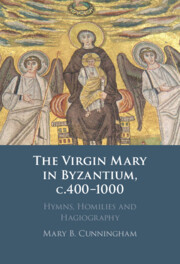Book contents
- The Virgin Mary in Byzantium, c. 400–1000
- The Virgin Mary in Byzantium, c. 400–1000 CE
- Copyright page
- Dedication
- Contents
- Acknowledgements
- A Note on Capitalisation, Spelling and Recent Publications
- Introduction
- Chapter 1 Praise of Mary in Song: The Early Hymnography
- Chapter 2 From Theotokos to Intercessor: The Early Homiletic Witness (c. 400–600)
- Chapter 3 Panegyrics and Supplication: Homilies from c. 600 to 1000
- Chapter 4 Theology in Verse: Middle Byzantine Hymnography
- Chapter 5 Narratives about the Panagia
- Conclusion
- Bibliographies
- Index
Chapter 2 - From Theotokos to Intercessor: The Early Homiletic Witness (c. 400–600)
- The Virgin Mary in Byzantium, c. 400–1000
- The Virgin Mary in Byzantium, c. 400–1000 CE
- Copyright page
- Dedication
- Contents
- Acknowledgements
- A Note on Capitalisation, Spelling and Recent Publications
- Introduction
- Chapter 1 Praise of Mary in Song: The Early Hymnography
- Chapter 2 From Theotokos to Intercessor: The Early Homiletic Witness (c. 400–600)
- Chapter 3 Panegyrics and Supplication: Homilies from c. 600 to 1000
- Chapter 4 Theology in Verse: Middle Byzantine Hymnography
- Chapter 5 Narratives about the Panagia
- Conclusion
- Bibliographies
- Index
Summary
This chapter turns to early Byzantine homiletics, beginning with the works of early fifth-century preachers including Hesychios of Jerusalem, Attikos, and Proklos of Constantinople. Problems with the dating and attribution of many of the earliest Marian hymns persist; this chapter offers new approaches to this subject. The preoccupation of fifth-century homilists remained Christological and we find few, if any, references to Mary’s intercessory power in the surviving sermons. However, the situation begins to change in the sixth century, with the homilies of (ps-)Basil of Seleucia, Severos of Antioch and Abraham of Ephesus displaying more interest in Mary’s human aspect and intercessory role between humanity and God. The sixth century is thus a turning point, as scholars have already remarked; with the addition of Marian feasts to the calendar during this period, preachers began to focus increasingly on the Virgin’s importance as a holy figure in her own right.
- Type
- Chapter
- Information
- The Virgin Mary in Byzantium, c.400-1000 , pp. 67 - 93Publisher: Cambridge University PressPrint publication year: 2021

